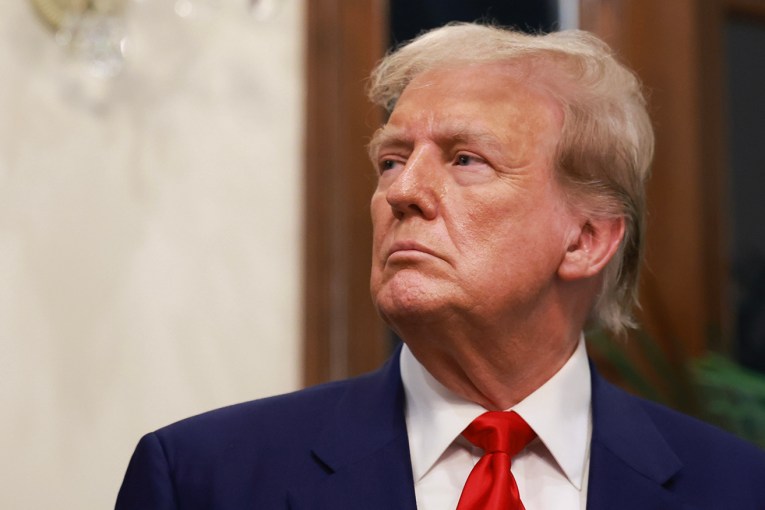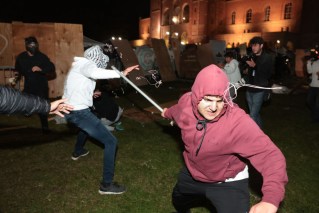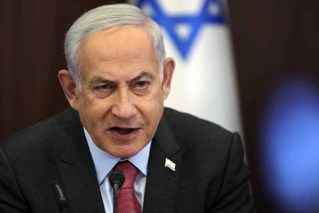Is Vladimir Putin leading the West into another Cold War?

Nuclear missile tests, warplanes intercepted over Europe, spy submarines and rigged elections. If they weren’t deadly serious, the latest accusations against Russia could be mistaken for scenes from a James Bond film.
In fact they’re so serious that NATO has labelled escalating tension between Europe and Russia over the Ukraine conflict: “The greatest threat to European security since the Cold War.”
The comments come after Russian warplanes – including fighters and strategic bombers – were intercepted over European airspace by NATO fighter planes on Tuesday and Wednesday.
Last week an unidentified vessel – thought to be a Russian spy submarine – was spotted in the Baltic Sea off the Swedish coast, however an extensive search and investigation failed to locate the suspected submarine or confirm its origins.
• Russian warplanes intercepted over Europe
• Cold War flashbacks in search for mystery sub
• UN, EU condemn rebel elections in Ukraine
• Russia tests nuclear missile
United Nations chief Ban Ki Moon joined the chorus of concern on Thursday, condemning plans by Russian-backed rebels to stage elections in areas of Ukraine under their control.
The UN chief warned the vote would “seriously undermine” the peace process in the already fragile conflict zone.
Posturing and sabre rattling between Russia and the West has reached fever pitch in the wake of the shooting down of Malaysia Airlines flight MH17 in Ukrainian airspace last July.
The West points the finger of blame squarely at Russian-backed separatists in Ukraine for shooting down the aircraft and the deaths of 298 people – including 38 Australians – on board.
Australian Prime Minister Tony Abbott was among the strongest critics of Russia, threatening to ‘shirtfront’ president Vladimir Putin over the MH17 tragedy if he visits Australia for the G20 Leaders Summit in November.
In addition to some bolshie anti-Putin rhetoric, Western leaders slapped Russia with the harshest economic sanctions since the days of the USSR.
With Putin at the helm, his resource-hungry nation is becoming increasingly isolated, both economically and politically.
But for all the country’s problems, the internationally maligned leader is enjoying enormous support at home.
Portrait of a tough guy
Vladimir Putin is easy to caricature.

Man of many talents Vladimir Putin. Photo: Getty
He is a former KGB spy who mourns the collapse of the Soviet Union and has little sympathy for democracy.
He has an inflated sense of strategic entitlement for his country with no room for independent neighbours.
He is not above using violence in politics, and has perfected its use abroad to a diplomatic art form.
But as the international crisis over Ukraine slowly escalates, it is important to remember that his behaviour is supported by most ordinary Russians.
Putin’s working day is said to begin with several hours spent reading intelligence reports, with little concern for policy beyond military reform.
This routine provides him with the detailed knowledge required to conduct a foreign policy of constant manoeuvre and improvisation.
Shock tactics

Ukrainian troops outside Mariupol. Photo: Getty
From Russia’s snap invasion of Georgia in 2008, to the last-minute proposal for eliminating Syria’s chemical weapons last year, Putin manages to consistently threat, cajole and wrong-foot his rivals.
Intervention in Ukraine is only the latest instance where he has seized the initiative to stifle change in Russia’s international neighbourhood.
This is an unsentimental, hard-edged approach to diplomacy. While resisting American pressure over Syria and Ukraine, Russia has mobilised and shuffled troops around the country, conducted large-scale military exercises, and increased surveillance flights from Europe to Asia.
The purpose is to show that Russia is powerful enough not to be intimidated by economic sanctions and NATO cooperation. It is a language of great power posturing which has been largely absent over the last two decades.
Russia plagued with problems
After a decade-and-a-half with Putin at the helm, Russia as a great power is still firmly in decline.
Putin is so focused on exercising raw power that he has exacerbated the country’s problems.
By using gas reserves as a bargaining tool, Russia has diverted much-need investment from exploration and innovation, and will likely be the principal loser from a worldwide shale boom.

Russian military officials explain their side of the story on the Malaysian Airlines disaster. Photo: Getty
Putin’s allies command the heights of the economy, but corruption is rank, and the wealthy elite station are so scared that they keep their financial assets and capital abroad.
When set against rising giants like China and India, Russia will increasingly resemble something like Saudi Arabia with a better military.
Most importantly, Putin is now dealing with a new, unpredictable factor in Russian public opinion.
With the crisis in Ukraine, many Russians now feel as if their president’s suspicion of the West has been vindicated, and they fear encirclement by an American-led NATO coalition.
But this is at odds with Putin’s tactical style. He has managed foreign policy through the careful and timely exploitation of weakness in others to avoid a trial of strength, but this is lost in a public debate with nationalist passions at play.
Indeed, only a couple of weeks ago, Putin’s cautious probing of Western resolve was criticised in Moscow as weakness.
Ukraine is a turning point for Putin. He has succeeded in improvising on small, localised issues which lie at the margins of world politics.
In a great power crisis, he has much less room for manoeuvre. With no simple compromise in sight, his burden is now the world’s to share.
• New sanctions against Russia
• PM beats drums of war
• Putin ‘possessed by Satan’
Inspiration

Putin opens a monument to Pyotor Stolypin in 2012. Photo: Getty
For all the media interest in Putin’s personality, Russia’s president is a product of his country’s troubled past.
A sprawling country built on centuries of expansion, the modern history of Russia has been a constant struggle to uphold central power against the threat of disintegration.
Indeed, more than any Soviet leader, Putin draws inspiration from Pyotor Stolypin, a Tsarist aristocrat whose centralising reforms delayed revolution in early twentieth century Moscow.
Having ascended to power through the years of corruption and financial crisis under Boris Yeltsin, Putin sees himself as performing a Stolypin-like role in restoring order.
The result is an overriding preoccupation with stability and security.
* David Schaefer is an international military expert and recent graduate of the Department of War Studies, King’s College London.
– with Patrick Elligett








